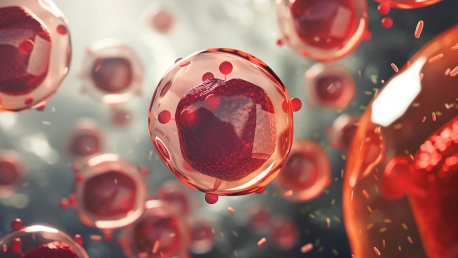Multiple myeloma (MM), a cancer that attacks the plasma cells in bone marrow, often evades cure, pushing scientists to constantly search for breakthrough therapies. Chimeric Antigen Receptor (CAR) T cell therapy represents one of the most innovative and promising strategies against relapsed MM. Its premise is compelling: reengineer a patient’s immune cells to better recognize and destroy cancer. However, the complexity of MM and patient variability demand tools that can predict treatment success. Biomarkers stand at the center of this quest, heralding a new era in which therapy is not just about combating the disease but doing so with strategic precision.
The Innovation of CAR T Cell Therapy
Delving into the cellular mechanics, CAR T cell therapy uses a patient’s T cells, which are collected and genetically modified to express receptors that specifically target antigens on cancer cells. Once reintroduced into the patient’s bloodstream, these engineered T cells seek out and obliterate cancer cells harboring the target antigen. In MM, the B cell maturation antigen (BCMA) is a prime target for CAR T cells, given its prevalence on myeloma cells. This focus has generated tremendous hope, especially for those who have already battled through lines of traditional therapies.Yet, as the marvel of this technology unfolds, so too does the realization that not all patients respond equally. The reasons why some experience deep, sustained remissions while others relapse shortly after treatment are largely enigmatic, hinting at the underlying biological diversity of MM. This disparity has intensified the pursuit of reliable biomarkers that could forecast therapeutic outcomes ahead of time, empowering more informed treatment decisions.
The Challenge of Predicting Outcomes
Pinpointing the likely winners in the CAR T cell therapy race is fraught with complexity. MM is a chameleon, assuming various genetic and phenotypic guises that complicate treatment. CAR T cell therapy, while innovative, faces this heterogeneity head-on. To bring structure to this unpredictability, researchers are zooming in on the intricacies of immune cell interactions and their associated markers in the blood and bone marrow of MM patients. Biomarkers are beginning to shine a light on how the body’s unique immune landscape might affect treatment response.Predictive biomarkers could dramatically change how we approach MM therapy, helping clinicians tailor treatments more precisely. They hold the promise of answering a critical question: which patients will derive long-term benefit from CAR T therapies, and how can we enhance this outcome for more patients?
Identifying Biomarkers for Treatment Efficacy
The quest for biomarkers essential in predicting CAR T cell therapy outcomes has been unyielding. Current research, such as that from the University of Leipzig Medical Center, reveals biological signposts like the presence of CD39-expressing monocytes and functional metrics of CD8+ T cells as potential harbingers of treatment response. Elevated levels of such monocytes or a lackluster showing from CD8+ T cells could herald a suboptimal reaction to the therapy, pre-empting disappointment and allowing for corrective strategic maneuvers. The idea is that a patient’s biology speaks volumes about their candidacy for CAR T cell therapy. By heeding this biological script, clinicians can be more informed when orchestrating their therapeutic approaches. These biomarkers are not just lights on a dashboard; they’re a GPS for navigating the treacherous road of MM treatment.
The Immunosuppressive Microenvironment in MM
The bone marrow microenvironment in MM is often immunosuppressive, a hub for signals and cells that can dampen the inflammatory response crucial for CAR T cell efficacy. This can include regulatory T cells, myeloid-derived suppressor cells, and a host of inhibitory cytokines that can all but turn off the CAR T cell engine. Identifying biomarkers responsible for this suppression could be key in not only predicting which patients will do well with CAR T cell therapy but also in devising strategies to counteract these effects.By understanding how the immunosuppressive microenvironment behaves, clinicians can employ strategic interventions. Whether that means combining CAR T cell therapy with agents that target these suppressive forces or modulating doses to outmaneuver resistance, the role of these predictive elements cannot be underestimated.
Personalized Medicine: Adapting Therapy to Patient Profiles
The concept of personalized medicine elevates the cancer fight to a bespoke battle. At its core are predictive biomarkers, allowing for the tailoring of CAR T cell therapies to the individual characteristics of each patient. By recognizing the nuances of each patient’s immune system, as spoken through these biomarkers, the therapy can be fine-tuned—optimizing the conditions under which CAR T cells can thrive and induce lasting remissions.Adjusting therapy to each patient, such as timing the infusion of CAR T cells to coincide with the lowest ebb of immunosuppressive activity or integrating treatments such as checkpoint inhibitors, increases the probability of success. The partnership of CAR T cells with potentially synergistic therapies could shift the odds significantly in the patient’s favor.
Future Perspectives in CAR T Cell Therapy
Multiple myeloma (MM), a malignancy targeting plasma cells within the bone marrow, often defies complete eradication, driving researchers to seek new groundbreaking treatments. One of the most advanced approaches is Chimeric Antigen Receptor (CAR) T-cell therapy, a technique that refashions a patient’s T-cells to more effectively identify and kill cancer cells. Nevertheless, the multifaceted nature of MM and differing responses among patients necessitate the development of predictive measures for therapeutic efficacy. Biomarkers are at the forefront of this endeavor, marking the advent of an era where the focus is not only on fighting MM but doing so with tactical precision. These biological indicators provide vital insights, fashioning personalized treatment plans which optimize outcomes for individuals afflicted by this persistent cancer. As the medical community continues to investigate and validate these markers, the promise of CAR T-cell therapy as a targeted and powerful weapon against relapsed MM becomes increasingly potent, offering a beacon of hope for those battling this relentless disease.









